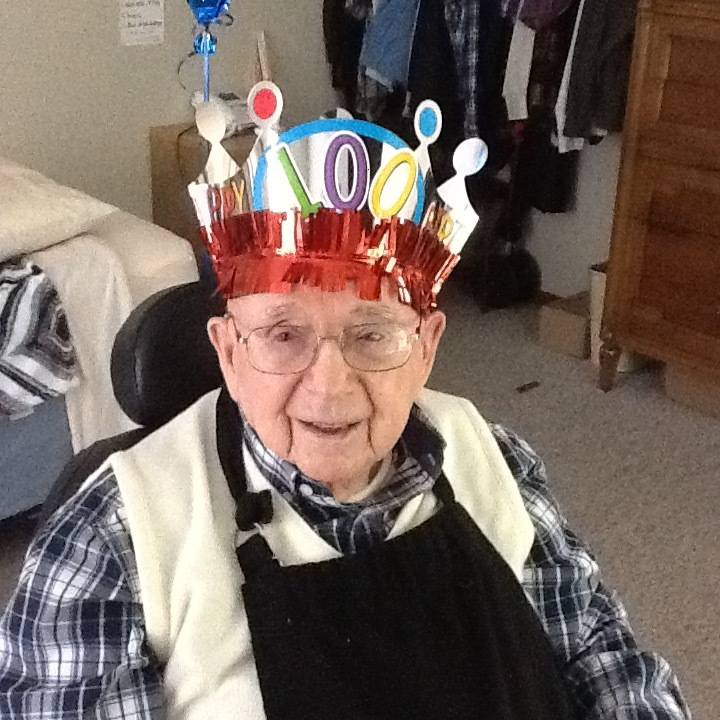Howard Harris will turn 101 in April. While this makes him the (presumed) current oldest Lopezian, it’s what Howard has done with his century that makes him fascinating.
Born in 1917 in Hazel, a miniscule South Dakota town, Howard and his twin Harold were their parents’ fifth and sixth children. As Howard’s daughter Connie Harris puts it, “Rumor is, Grandpa went to get the mail, and when he came back, he had two more boys.” Howard jokes, “My dad said, ‘Well, I’ll never call that doctor again!’”
The family grew grain, but as adolescents, the twins left to work at a creamery, milking 10 cows morning and night, sleeping in the hayloft. “We could have a bath every day,” Howard says, “in the horse trough.”
The brothers rode doubles on a big work horse to their one-room school. “In the wintertime, that horse didn’t like it at all,” Howard says. “He’d take us down to the corner and turn around.” Howard rode behind Harold; “He never let me drive,” he remembers. But if anyone picked on Howard, Harold defended him.
The students were ruled by a schoolmaster who wielded a whip against troublemakers. Once Harold was in for a whipping, but the boys told their dad; their father came to school and got in a fight with the schoolmaster himself. “It was an exciting time,” Howard comments.
Years before 1929, Dakota farmers were suffering under drought, dust and debt. Howard describes the horrendous scene of his dad and their neighbors, unable to feed their horses and cattle, digging an enormous ditch in which to bury the animals. “Dad said don’t go down there, but I sneaked down … Men were shooting their horses and crying.” Howard was 11. Leaving school after seventh-grade, he continued working until, like so many others, his folks lost their farm.
The family moved temporarily to the city of Aberdeen, but later they were able to lease and work another farm, with Howard’s help. But eventually, Howard became a grocer in Aberdeen, making beautiful displays. Promoted to chief grocer in another town, Howard worked across from a hospital, where he spied a lovely young nurse.
“I remember like it was yesterday,” he says. “This beautiful woman walking down the steps all dressed in white.” That was Phyllis Ohlinger in her stiff, white bonnet. “She walked past the store, but she wouldn’t even look at me,” Howard relates. “But she ate lunch in the restaurant next door, so I went too and sat down beside her. She was a nice gal, very smart.”
The couple decided to move to Portland, Oregon, where Phyllis had a friend and a potential hospital job — an unusual case, in those days, of a woman’s career taking precedence. They traveled across the country still unwed, but Howard laughingly assures us that the trip was completely above-board. Howard and Phyllis were married for 75 years, until Phyllis passed away in 2016.
After starting their family, the Harrises moved to West Seattle, and Howard went to work for Boeing. Making airplanes represented a significant pay jump from grocery stores, and Howard’s jack-of-all-trades farming experience allowed him to sign on as a machinist. Howard loves to tell stories from his 35 years at Boeing, including a run-in with his boss’s son, which ended with Howard teaching the kid a lesson in work habits. Was it a good career? “It was a dandy.”
In the 1980s, Howard and Phyllis moved to a little farm in Stanwood, quite a commute. But eventually he retired, taking up beekeeping—“the girls,” he called his bees fondly. Connie tells a story about getting her dad’s help when she and husband Jim first set up bees on their Lopez kiwi farm. Howard and Phyllis brought the enclosed bees over on the ferry, but during the crossing, the bees escaped and filled up the car. “Dad’s very calm with his girls; he just takes his hand and brushes them off the windshield,” Connie remembers. “I don’t think either of them got stung.”
Other passions in retirement became gardening, fishing and golf, and the Harrises moved to Camano Island to live by a golf course. They also loved to camp and fish—“any kind of fishing,” Howard affirms, proceeding to tell a classic fish story about landing the big one.
A few years ago the couple moved to Mount Vernon, which they enjoyed, but after Phyllis passed, Connie got her dad to move to Lopez. “I can’t say enough about how much Mom and Dad helped us getting set up on our farm,” she says, describing Howard’s farming mentorship. Because of this, Lopez already felt like home to Howard. Now he’s happy at the Hamlet: “They’re very good people here.”
Howard has eight great-grandchildren, but he also connects with Lopez kids by building birdhouses for them to decorate. Lopez’s reigning centenarian is not resting on his laurels.



